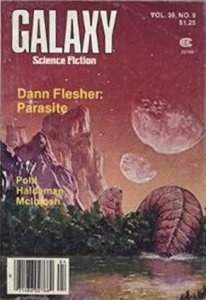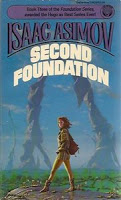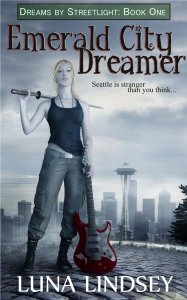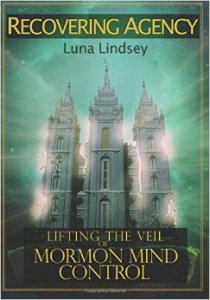For this week’s Flashback Friday post, I’m honored to have author, Luna Lindsey, here for a guest post on how the family library and thus, her father, influenced her as a writer.
 My writing is influenced by every book I have ever read. The family library is my greatest influence.
My writing is influenced by every book I have ever read. The family library is my greatest influence.
The entire wall of my childhood living room was decorated in a wall-to-ceiling shelf perpetually filled with books. Just the presence of the shelf was an inspiration, even if I had never read any of them. But read them, I did.
My father was a product of the Golden Age of Sci-Fi. Many of the titles on that shelf were by the “Big Three” and their immediate descendants: Isaac Asimov, Ray Bradbury, Arthur C. Clarke, Robert Heinlein, Larry Niven, and Orson Scott Card.
Even more influential than these greats was my father himself. His only published story was featured on the cover of Galaxy in 1979.
My parents taught me how to use a typewriter and send query letters. My dad would let me help him build worlds, and together, we designed an intelligent species of carnivorous plant that spread seeds by exploding, and that evolved to launch its children into space.
His dreams have become my own, and that still motivates me to this day.
My next greatest influence is Isaac Asimov, the most represented author among my father’s paperbacks. His short story collections collectively hooked me. All of his stories seemed set in the same universe, progressing from near-future on to the 50,000 years future setting of the Foundation novels. These were idea stories, rarely with good characterization, because the ah-ha! feeling of exploring “what-ifs” took precedence. Yet even his cardboard cutout characters could make me cry, like Cranwitz in 2430, as he kills off the last non-human creatures on Earth.
 And I’ll never forget Arkady Darell, the teenage girl who stowed away on a spaceship in Second Foundation, who later went on to become a writer. She was like me. Though Asimov had few female protagonists (and most were children or wives), here was someone my own age, strong, and the hero.
And I’ll never forget Arkady Darell, the teenage girl who stowed away on a spaceship in Second Foundation, who later went on to become a writer. She was like me. Though Asimov had few female protagonists (and most were children or wives), here was someone my own age, strong, and the hero.
Aside from teaching me a love of hard SF, Asimov taught me the importance of giving every reader a chance to sit in the driver’s seat, by offering a variety of characters for people to identify with.
My earliest memory of reading sci-fi was in 3rd grade, with Madeleine L’Engle’s A Wrinkle in Time. Again, it featured a protagonist like myself. Wrinkle was the first world I felt fully transported into. (Tolkien‘s Fellowship is my second memory of this happening.) L’Engle gave me my first taste of sci-fi, and she was a female author. She made me want to be like her when I grew up.
Based on how often she’s listed as an influence, perhaps L’Engle should win some kind of prize for being the most inspirational sci-fi author in history.
Ray Bradbury fine-tuned my ear for prose. His ability to paint with words is a model that every writer should study. Just about any passage of Bradbury is a poem, like this bit from Dandelion Wine:
The grass whispered under his body. He put his arm down, feeling the sheath of fuzz on it, and, far away, below, his toes creaking in his shoes. The wind sighed over his shelled ears. The world slipped bright over the glassy round of his eyeballs like images sparked in a crystal sphere. Flowers were sun and fiery spots of sky strews through the woodland. Birds flickered like skipped stones across the vast inverted pond of heaven. His breath raked over his teeth, going in ice, coming out fire. Insects shocked the air with electric clearness. Ten thousand individual hairs grew a millionth of an inch on his head. He heard the twin hearts beating in each ear, the third heart beating in his throat, the two hearts throbbing his wrists, the real heart pounding his chest. The million pores on his body opened.
I’m really alive! he thought. I never knew it before, or if I did I don’t remember!
I had the honor of channeling Bradbury’s spirit to write Beyond Earth’s Summer for Penumbra eMag in 2013, a story using Bradbury’s style and voice, and also about what happened to his lost soul.
Bradbury’s book on the craft, Zen and the Art of Writing, is a must-read for authors.
My final influence worth mentioning is Orson Scott Card, who today is a controversial figure. Since I was raised Mormon, he was something of a folk hero in my community. Card’s showcase talent is as a storyteller. He can weave an engaging, hard-to-put-down tale that he as a writer had as difficult a time wrapping up as the reader did. When you opened a Card book, you knew you were going along for a ride and you would be sad when it was over.
Card, like Bradbury, gives excellent writing advice. His writing on writing is invaluable.
These are the authors who passed on their sparks to me. Like a flame, it only grows brighter the more you share it around.

Available at Amazon.com

Available at Amazon.com

